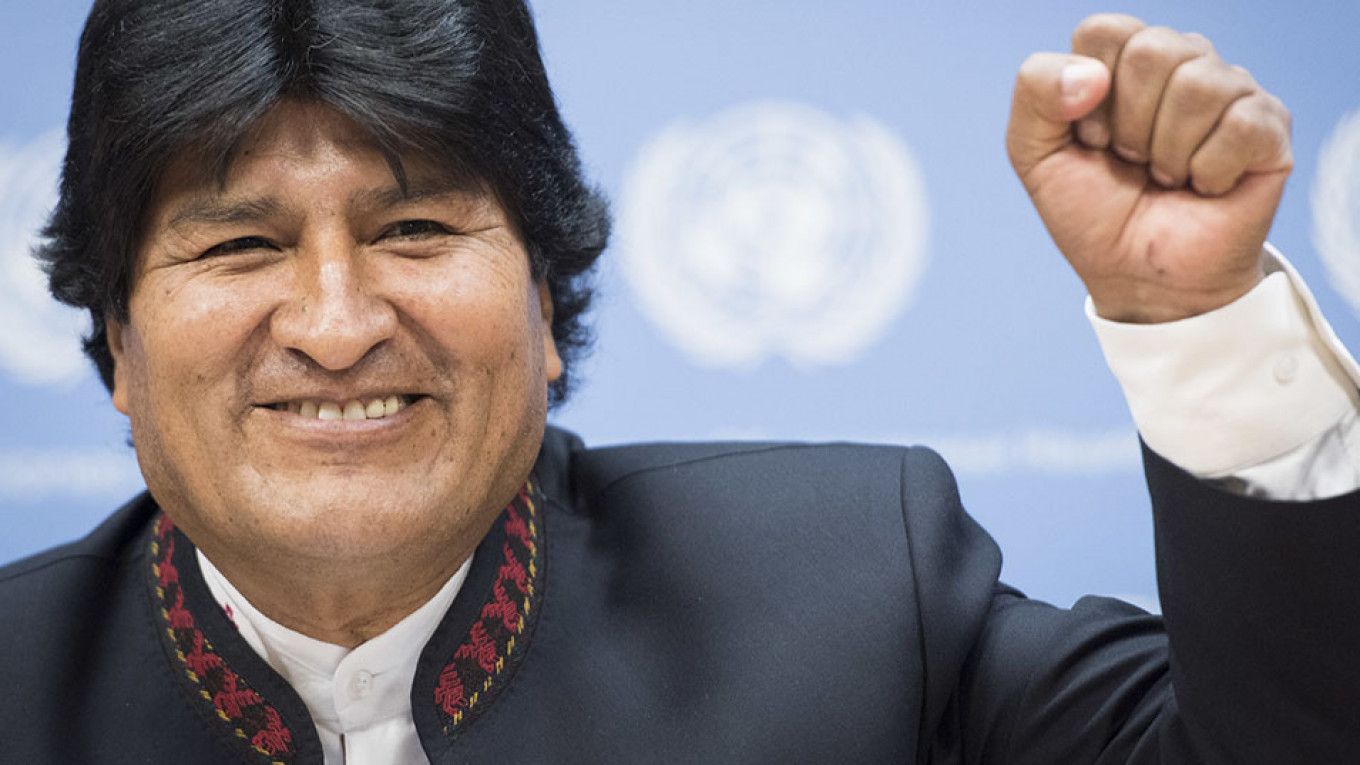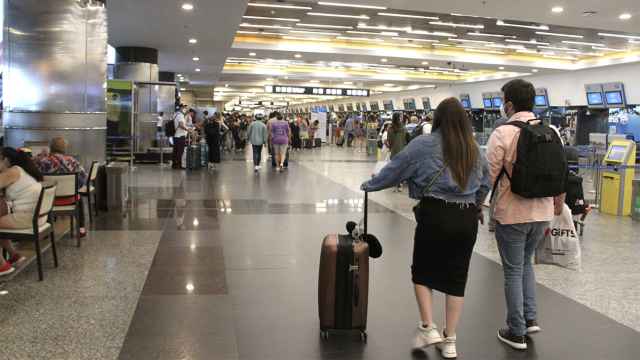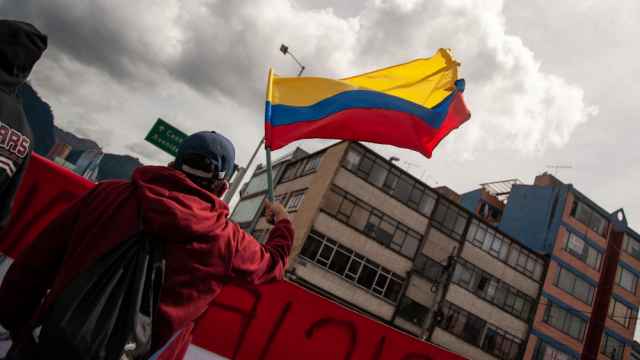Russian opposition leaders rejoiced at the forced resignation of Bolivian President Evo Morales, while the Russian foreign ministry branded it an “orchestrated coup.”
The interest in the drama playing out so far from Moscow is understandable, and not just because Morales had handed lucrative projects to Russian state companies.
In 2024, President Vladimir Putin faces the same choice that Morales faced this year — to obey the constitutional term limit or to sweep it aside and try to keep power.
Bolivia has a long history of military coups and aborted presidencies. Carlos Mesa, the current opposition leader, resigned after two years as president in 2005 amid mass protests. That paved the way for the first electoral victory of Morales in December of that year. The new president declared that power now belonged to the indigenous people of Bolivia and that the country’s natural resources would be nationalized — a decision that had been backed by a referendum held during Mesa’s presidency but not implemented by him.
Morales, who doesn’t have a college degree, has turned out to be the most successful leader in Bolivia’s dolorous history of poverty, strife and military defeat. Poverty declined during his rule.
Per-capita economic output, meanwhile, rose faster than the regional average.
Morales, however, was an authoritarian ruler who quickly found rapport with the leaders of Cuba and Venezuela — and with the Putin regime in Russia, which finds it easy to do arms and energy business with autocrats.
Rosatom Corp., the Russian state nuclear monopoly, got a contract to build a $300 million nuclear center near La Paz, the Bolivian capital, and began negotiating a concession to develop Bolivia’s large lithium reserves. Gazprom PJSC, the Russian state-controlled natural-gas company, has been present in Bolivia since 2010.
Russia also has been trying to sell weapons to Bolivia, especially helicopters; Putin himself has tried to talk Morales into it, but actual sales have been held back by Bolivia’s shortage of funds.
Bolivia’s constitution has included a two-term limit for presidents since 2009, meaning Morales could serve for three terms because his first one started before the limit took effect. In 2016, he tried to remove the cap but lost a referendum.
Morales appeared to accept that he’d have to leave, but in 2017, the country’s constitutional court controversially ruled against the term limit, and he was allowed to run again.
Rosatom reportedly even sent a team of Russian election experts to back his campaign and thus protect the Russian state companies’ interests. On Oct. 20, however, Morales was still unable to beat Mesa by the margin he needed to avoid a runoff, and then major vote-counting irregularities became so obvious that mass protests erupted and even Bolivia’s labor unions turned against the president.
But Morales only resigned when the military said it wouldn’t crush the protests and urged him to go. Clearly, Bolivian generals have learned the lessons of 2003, when they followed then-President Gonzalo Sanchez de Lozada’s orders to use force against protesters demanding the nationalization of the country’s natural-gas deposits. At least 67 people were killed and some 400 injured; Lozada was sued by the victims’ families in the U.S., where he lives now, but was cleared last year because the judge found the evidence of his culpability insufficient. (Mesa, who served as Lozada’s vice president, had opposed the violence).
Morales described the events that forced him to resign as a coup, and his words were echoed not just by Russia, whose contracts in Bolivia are at risk now, but by a roster of international leftists, ranging from U.S. Congresswoman Ilhan Omar to U.K. Labour Party leader Jeremy Corbyn. Putin’s opponents in Russia were, on the contrary, encouraged.
Corruption fighter Alexei Navalny tweeted a photo of Morales with Putin, accompanied by this caption: “A corrupt president who was illegally holding on to power through lies and falsifications, has fled the country. For now, just the one on the left.”
Leonid Volkov, another leading opposition figure, tweeted, “I really wish we could be like Bolivia.”
The jubilation and the envy won’t pass unnoticed in the Kremlin. Putin has more than four years to explore his options for 2024, when his own presidency comes up against a constitutional term limit, but there is no obvious quasi-legitimate scenario that would allow him to stay in the Kremlin.
There appears to be no appetite for a risky move to a parliamentary republic, which would make the prime minister’s office the most powerful and allow Putin to get re-elected as many times as he can. And ruling by proxy, as Putin did during Dmitry Medvedev’s presidency between 2008 and 2012, clearly disappointed Putin himself since he moved to undo Medvedev’s feeble attempt at liberalizing the country.
The most obvious option is simply to alter the constitution to remove the term limit. But the Morales example shows the pitfalls of this strategy. While he’s respected and his contribution to reducing poverty is widely acknowledged, even his supporters are tired of him after 13 years in power; it’s only natural for people to grow restless without change. When that happens, critical decisions must eventually be taken by the military and the police.
In Venezuela, President Nicolas Maduro has managed to keep the military loyal, and he still hasn’t been deposed. In Bolivia, Morales had retained the military’s support throughout his rule because he didn’t demand too much from his enforcers. But when popular protest reached a high point, the generals wouldn’t move against them, and Morales was finished.
All this Latin American experience, closely monitored in Moscow because of state companies’ business dealings in the region, will serve to convince Putin that an authoritarian’s natural term limit isn’t the one specified in the constitution. In reality, he can rule until his enforcers decide they can’t afford to follow his orders.
That means Putin must keep buying the loyalty of Russia’s vast security apparatus, which is already costing the government about 10% of its non-classified budget. The National Guard, which includes riot police, is slated for big spending increases in the next four years.
This article was first published by Bloomberg.
A Message from The Moscow Times:
Dear readers,
We are facing unprecedented challenges. Russia's Prosecutor General's Office has designated The Moscow Times as an "undesirable" organization, criminalizing our work and putting our staff at risk of prosecution. This follows our earlier unjust labeling as a "foreign agent."
These actions are direct attempts to silence independent journalism in Russia. The authorities claim our work "discredits the decisions of the Russian leadership." We see things differently: we strive to provide accurate, unbiased reporting on Russia.
We, the journalists of The Moscow Times, refuse to be silenced. But to continue our work, we need your help.
Your support, no matter how small, makes a world of difference. If you can, please support us monthly starting from just $2. It's quick to set up, and every contribution makes a significant impact.
By supporting The Moscow Times, you're defending open, independent journalism in the face of repression. Thank you for standing with us.
Remind me later.








